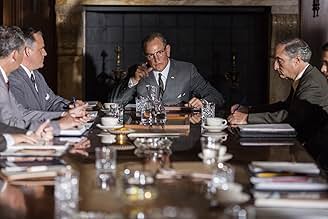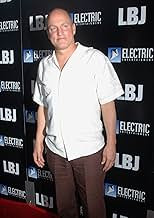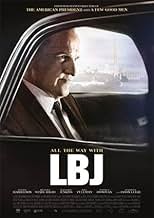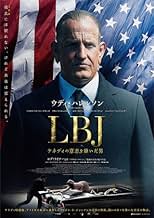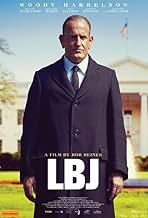Lyndon B. Johnson s'aligne sur John F. Kennedy, accède à la présidence et s'occupe de la lutte pour les droits civiques des années 60.Lyndon B. Johnson s'aligne sur John F. Kennedy, accède à la présidence et s'occupe de la lutte pour les droits civiques des années 60.Lyndon B. Johnson s'aligne sur John F. Kennedy, accède à la présidence et s'occupe de la lutte pour les droits civiques des années 60.
- Prix
- 1 nomination au total
Michael Francis Horn
- Cliff Carter
- (as Michael Horn)
Histoire
Le saviez-vous
- AnecdotesWoody Harrelson's late father Charles Harrelson was a Texas hitman who had famously claimed to have killed President Kennedy (he was sentenced to life in prison for murdering a Texas judge), but later admitted that he made up the story.
- GaffesHistorical quotes throughout the movie are edited to be more sensitive than the actual quotes were.
- Citations
Lyndon B. Johnson: You know, this could be your lucky day. You might be able to vote your conscience on the Farm Bill.
Senator Ralph Yarborough: I like to think that is the only way that I ever vote.
Lyndon B. Johnson: Spoken like a true one-term senator.
- ConnexionsReferenced in Midnight Screenings: Tulip Fever (2017)
- Bandes originalesSons of Thane
Written by John Knowles
Courtesy of APM Music
Commentaire en vedette
Few things are as comfortable as a Rob Reiner film. The director who is still commonly referred to lovingly as Meathead by fans of the iconic All in the Family television series has been directing films since the early 80's and his films are consistently entertaining inoffensive fair marketed to mass audiences. The Princess Bride, A Few Good Men, The American President and The Bucket List are just a sampling of the director's filmography that audiences will be familiar.
Those that watch Rob Reiner on the talk show circuit would know that the outside of being an actor and director, he is very political activist who uses his celebrity status to bring attention to equal rights and to social issues such as violence and tobacco use.
So it is a bit of surprise that Rob Reiner has never made a film that might leverage his strong activist lifestyle. Until now, that is.
LBJ is Rob Reiner's film about the 36th President of the United States, Lyndon B. Johnson, who was thrust from the Vice-President's chair to the Oval Office desk after the assassination of John Fitzgerald Kennedy on that fateful November day in 1963.
Woody Harrelson plays LBJ and the film takes us backwards and forwards in time from LBJ's unsuccessful run for the Democratic Party nomination through JFK's assassination and ultimately through the President's fight for an Equal Rights Bill.
The heart of the film comes from LBJ's battle within his own party. Robert Kennedy (Michael Stahl-David) is hardly a fan of the foul-mouthed Texan who was hand-picked by brother John for the Vice-President position. The two will battle wills and disagree on almost all political talking points throughout their tenures. Also providing resistance to LBJ's forward thinking is Senator Richard Russell (Richard Jenkins) from the state of Georgia. Russell is portrayed as a racist that does not believe that individuals of color deserve the same rights and freedoms as all other Americans. LBJ does his best to try and win the trust of Russell and LBJ walks the thin line of keeping Russell in the fold before he abandons his friendship with the Senator in his attempt to fulfill the inroads JFK had made in his equal rights efforts prior to his assassination.
Harrelson is barely recognizable as the title character. The make-up is thick to ensure he resembles the former President. At times, the make-up is brilliant. The big ears and receding hairline of LBJ is captured expertly. But at other times – particularly in close-ups – the make-up looks like Harrelson was an extra in Warren Beatty's Dick Tracy film.
LBJ is obviously the focus, but there is ample time given to JFK. And the assassination in Texas is captured with valuable attention to detail. The assassination is a key point in the life of LBJ and Rob Reiner takes the time to film it correctly (it was filmed in Texas exactly where the shooting took place). Jeffrey Donovan (televisions Burn Notice) plays Kennedy and brings subtle touch to the role not attempting to overdo the Boston drawl.
As with all other Reiner films, LBJ plays it safe. Audiences may learn a few things about the complicated man along the way. His foul mouth, how he would have meetings while sitting on the toilet, and his insecurity always believing that he was not loved by either his inner circle or his country (he did win re-election by the widest margin in American history). To my embarrassment, I didn't know that LBJ was in a procession car with JFK the day he was killed. But LBJ is no Lincoln. Where the Spielberg film was brilliantly written and a character study of both a political family and the process to which they battled, LBJ skims the surface like a rock skipping along calmer waters. Gritty, LBJ is not.
But safe entertainment can still be good entertainment and Reiner is surely a master at that craft. There is plenty of humor in the film to keep the characters interesting and keeping the story non-linear works to valued effect. LBJ will not be considered Rob Reiner's best work, but it is exactly what you can come to expect from the director. And slipping into a comfortable shoe can be so so comfortable.
Those that watch Rob Reiner on the talk show circuit would know that the outside of being an actor and director, he is very political activist who uses his celebrity status to bring attention to equal rights and to social issues such as violence and tobacco use.
So it is a bit of surprise that Rob Reiner has never made a film that might leverage his strong activist lifestyle. Until now, that is.
LBJ is Rob Reiner's film about the 36th President of the United States, Lyndon B. Johnson, who was thrust from the Vice-President's chair to the Oval Office desk after the assassination of John Fitzgerald Kennedy on that fateful November day in 1963.
Woody Harrelson plays LBJ and the film takes us backwards and forwards in time from LBJ's unsuccessful run for the Democratic Party nomination through JFK's assassination and ultimately through the President's fight for an Equal Rights Bill.
The heart of the film comes from LBJ's battle within his own party. Robert Kennedy (Michael Stahl-David) is hardly a fan of the foul-mouthed Texan who was hand-picked by brother John for the Vice-President position. The two will battle wills and disagree on almost all political talking points throughout their tenures. Also providing resistance to LBJ's forward thinking is Senator Richard Russell (Richard Jenkins) from the state of Georgia. Russell is portrayed as a racist that does not believe that individuals of color deserve the same rights and freedoms as all other Americans. LBJ does his best to try and win the trust of Russell and LBJ walks the thin line of keeping Russell in the fold before he abandons his friendship with the Senator in his attempt to fulfill the inroads JFK had made in his equal rights efforts prior to his assassination.
Harrelson is barely recognizable as the title character. The make-up is thick to ensure he resembles the former President. At times, the make-up is brilliant. The big ears and receding hairline of LBJ is captured expertly. But at other times – particularly in close-ups – the make-up looks like Harrelson was an extra in Warren Beatty's Dick Tracy film.
LBJ is obviously the focus, but there is ample time given to JFK. And the assassination in Texas is captured with valuable attention to detail. The assassination is a key point in the life of LBJ and Rob Reiner takes the time to film it correctly (it was filmed in Texas exactly where the shooting took place). Jeffrey Donovan (televisions Burn Notice) plays Kennedy and brings subtle touch to the role not attempting to overdo the Boston drawl.
As with all other Reiner films, LBJ plays it safe. Audiences may learn a few things about the complicated man along the way. His foul mouth, how he would have meetings while sitting on the toilet, and his insecurity always believing that he was not loved by either his inner circle or his country (he did win re-election by the widest margin in American history). To my embarrassment, I didn't know that LBJ was in a procession car with JFK the day he was killed. But LBJ is no Lincoln. Where the Spielberg film was brilliantly written and a character study of both a political family and the process to which they battled, LBJ skims the surface like a rock skipping along calmer waters. Gritty, LBJ is not.
But safe entertainment can still be good entertainment and Reiner is surely a master at that craft. There is plenty of humor in the film to keep the characters interesting and keeping the story non-linear works to valued effect. LBJ will not be considered Rob Reiner's best work, but it is exactly what you can come to expect from the director. And slipping into a comfortable shoe can be so so comfortable.
- gregsrants
- 17 sept. 2016
- Lien permanent
Meilleurs choix
Connectez-vous pour évaluer et surveiller les recommandations personnalisées
- How long is LBJ?Propulsé par Alexa
Détails
- Date de sortie
- Pays d’origine
- Site officiel
- Langue
- Aussi connu sous le nom de
- The President: Lyndon B. Johnson
- Lieux de tournage
- sociétés de production
- Consultez plus de crédits d'entreprise sur IMDbPro
Box-office
- Budget
- 26 000 000 $ US (estimation)
- Brut – États-Unis et Canada
- 2 470 979 $ US
- Fin de semaine d'ouverture – États-Unis et Canada
- 1 110 565 $ US
- 5 nov. 2017
- Brut – à l'échelle mondiale
- 2 510 151 $ US
Contribuer à cette page
Suggérer une modification ou ajouter du contenu manquant






